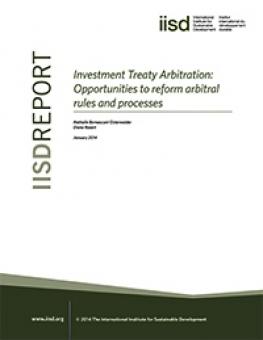
Investment Treaty Arbitration: Opportunities to reform arbitral rules and processes
Investors are increasingly turning to investor-state arbitration to challenge a wide range of government measures, including laws, regulations and administrative decisions in all economic sectors.
Less than 20 years ago this form of international arbitration was rarely used to settle disputes between foreign investors and host states. Now it is used frequently, and the number of cases is increasing rapidly. Issues of concern include the lack of transparency, the impartiality and independence of arbitrators, the lack of predictability and consistency of interpretation, and the high costs involved, to name a few. This paper identifies opportunities for the reform of arbitral rules and processes and assesses their potential impact and utility. In addition, the paper looks at the number of investor-state disputes brought under the different arbitration rules and administered by different institutions, and evaluates whether arbitrations conducted under different rules lead to similar outcomes for states and investors. The paper also examines the governing structures of the relevant institutions, comparing the reform opportunities between inter- and non-governmental bodies, and identifies selected areas for possible reform under different rules and institutions, including transparency, arbitrator independence, and consistency and correctness of arbitral awards. Finally, the findings of the paper are discussed in the context of the broader reform debate.
You might also be interested in
Agreement on Climate Change, Trade and Sustainability: A landmark pact for trade and sustainability
The ACCTS pact, signed by Costa Rica, Iceland, New Zealand, and Switzerland, aligns trade and environmental policies, tackling fossil fuel subsidies, eco-labels, and green trade.
Why the Energy Charter Treaty Modernization Doesn't Deliver for Climate
The Energy Charter Conference adopted the "modernized" Energy Charter Treaty (ECT) on December 3, 2024. IISD's Lukas Schaugg explains what the modernization does, when it will enter into force, its tension with EU law, and why the reformed ECT can still hinder climate policies.
Addressing Carbon Leakage: A toolkit
As countries adopt ambitious climate policies, this toolkit examines strategies to prevent carbon leakage—when production and emissions shift to nations with weaker climate policies—and explores the trade-offs of each approach.
IISD Trade and Sustainability Review, December 2024
This edition of the IISD Trade and Sustainability Review presents four expert perspectives on how agricultural support and subsidies can promote sustainability in developing and least developed countries.